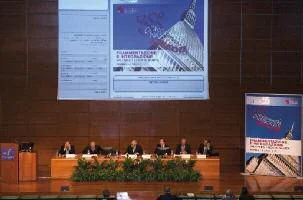HealthManagement, Volume 14, Issue 3 /2012
The 38th ANMDO National Congress: ‘FRAGMENTATION AND INTEGRATION - Values and Ethics in Healthcare’ , held again in Turin to celebrate the 65th anniversary of the ANMDO foundation, analysed the issues of the on-going processes of fragmentation and integration of the healthcare systems, in particular looking at the ethical values involved. Various aspects of the problem have been highlighted: The role of Medical Management; health technology assessment (HTA); prevention; clinical risk management; and hygiene in health facilities.
Moreover, new forms of collaboration, cooperation and competition in the countries of the European Union have been presented, and great interest was expressed by the participants.
Fragmentation affects policies, organisations and operation in healthcare. Responsibilities are more and more fragmented at the different institutional levels. Integration policies do not seem to be at the centre of intense dialogue among the subjects involved. According to ANMDO, a constructive, interactive relationship between the different disciplinary and specialised skills, and between the different professionalisms in healthcare, based on a shared vision of values and ethics, is the best and only strategy to reduce fragmentation and promote integration.
National Health Services must learn and evolve. An integrated approach is mandatory. Healthcare systems management and planning have to evolve around the citizens’ needs, enhancing the role and responsibilities of doctors and health workers, in order to have services improved, and of higher quality.
Clinical governance is the set of tools and processes which allows healthcare organisations to inspire and give support to the various healthcare workers’ acts and conducts on diagnostic, therapeutic and rehabilitative choices, providing, in parallel, clear scientific evidence and the ability to evaluate correctly cost-effectiveness and cost-efficiency. The objectives of a clinical governance strategy are the continuous improvement of service quality, the achievement and sustainability of high standards of care and work environments that foster professional excellence.
In Italy, the medical manager of a National Health Service Trust is also responsible for clinical governance. It is his/her duty to manage the four key dimensions of quality: Professional quality; perceived quality (ability to satisfy the expectations of patients and employees); efficiency (rational use of available resources); and risk management (patients’ risk reduction). To this end, the medical manager promotes and coordinates actions aimed to improve the efficiency and effectiveness of health services. At the hospital level, the medical manager is engaged in managerial, organisation, scientific, hygiene related, preventive and legal activities. She/he has also to deal with education and training, improving the health services quality and performances. The medical manager has the responsibility to set the course of actions, taking into account the continuously changing environment in which one has to operate, proposing optimal solutions.
We live in a time of accelerated innovations. The evolution of science and knowledge in all areas influences political, social and economic dimensions. New approaches and solutions are urgently needed to cope with the current changes. Clinical governance, health technology assessment, evidence-based healthcare and risk management are quintessential tools of growing importance. But they do not suffice. Rational principles to express value judgements about human actions are equally important. One has to design and manage possible futures. What is needed, badly needed, is ethics with its set of values and characteristics.
We, medical managers, should, now more than ever, eliminate ineffective, negligent and utilitarian behaviours. We must maximise our ability to create an environment that is able to ensure proper patient care and the responsible management of common wealth.
ANMDO believes that passion, compassion and honesty are among the fundamental ethical values in healthcare. Passion is the love for the medical profession and, for those who need assistance, passion is the ability to short circuit brain, heart and guts. Compassion is what makes us feel sorrow or pain for wrongs of others and is the main ethical principle of human relationship. Honesty is acting and communicating in a fair, honest and transparent way, according to moral principles that are universally considered valid.
Today, to what extent are these values present in healthcare? The ANMDO National Congress has tried to suggest possible answers also to this question.
Gianfranco Finzi
ANMDO National President
Ugo Luigi Aparo
ANMDO Scientific Secretary







